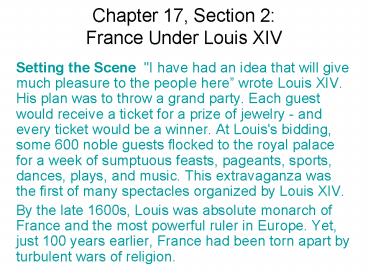Chapter 17, Section 2: France Under Louis XIV - PowerPoint PPT Presentation
1 / 25
Title:
Chapter 17, Section 2: France Under Louis XIV
Description:
... Huguenots and nobles, groups that did not bow to royal authority ... Louis XIV turned a hunting lodge into the palace of Versailles, the grandest in Europe ... – PowerPoint PPT presentation
Number of Views:221
Avg rating:3.0/5.0
Title: Chapter 17, Section 2: France Under Louis XIV
1
Chapter 17, Section 2 France Under Louis XIV
- Setting the Scene "I have had an idea that will
give much pleasure to the people here wrote
Louis XIV. His plan was to throw a grand party.
Each guest would receive a ticket for a prize of
jewelry - and every ticket would be a winner. At
Louis's bidding, some 600 noble guests flocked to
the royal palace for a week of sumptuous feasts,
pageants, sports, dances, plays, and music. This
extravaganza was the first of many spectacles
organized by Louis XIV. - By the late 1600s, Louis was absolute monarch of
France and the most powerful ruler in Europe.
Yet, just 100 years earlier, France had been torn
apart by turbulent wars of religion.
2
I. Rebuilding France
- From the 1560s to the 1590s, religious wars
between Huguenots (French Protestants) and the
Catholics tore France apart
On August 24, 1572 thousands of Protestants were
killed in the Massacre of St. Bartholomew
3
A. Henry IV
- In 1589, the Huguenot prince Henry IV inherited
the throne and became a Catholic
Early in his career he was a major leader of the
Protestant Huguenot party. For three years after
his accession to the throne of France in 1589,
the strongly pro-Catholic Paris stood in
opposition to him. Finally Henry yielded to
these stronger political interests by converting
to Catholicism, claiming that Paris was worth a
mass.
4
A. Henry IV
- To protect Protestants, he issued the Edict of
Nantes in 1598, granting the Huguenots religious
toleration
400th Anniversary - Edict of Nantes
Huguenot Cross
5
B. Richelieu
- Henry IV was killed by an assassin in 1610, and
his 9 year old son Louis XIII inherited the throne
Assassin François Ravaillac "Before being drawn
and quartered, he was scalded with burning
sulphur, molten lead and boiling oil and resin,
his flesh then being torn by pincers."
6
B. Richelieu
- In 1624, Louis appointed Cardinal Armand
Richelieu as his chief minister
Louis XIII
Richelieu
7
B. Richelieu
- Richelieu sought to destroy the power of the
Huguenots and nobles, groups that did not bow to
royal authority
Cardinal Richelieu at the Siege of La Rochelle
8
II. Louis XIV, the Sun King
- Louis XIV inherited the throne in 1643, when he
was 5 years old
9
II. Louis XIV, the Sun King
- Cardinal Jules Mazarin replaced Richelieu as
chief minister and worked to expand royal power
10
II. Louis XIV, the Sun King
- Shortly after taking the throne, violence swept
France in an uprising called the Fronde
11
A. "I Am the State"
- Louis IV firmly believed in divine right and took
the sun as the symbol of his absolute power
12
A. "I Am the State"
- Louis often said I am the state and never
called a meeting of the Estates General during
his reign
13
B. Strengthening Royal Power
- Louis XIV expanded the bureaucracy and made the
French army the strongest in Europe
14
B. Strengthening Royal Power
- Finance minister Jean Colbert followed
mercantilist policies, making France the
wealthiest state in Europe
15
III. Versailles, Symbol of Royal Power
- Louis XIV turned a hunting lodge into the palace
of Versailles, the grandest in Europe
16
III. Versailles, Symbol of Royal Power
- He held ceremonies that emphasized his own
importance and tied the nobles to their king
The Levee
17
III. Versailles, Symbol of Royal Power
- The court supported a "splendid century" of the
arts and French style became the model for Europe
18
IV. Successes and Failures
- Louis XIV ruled France for 72 years, longer than
any other monarch
19
IV. Successes and Failures
- French culture replaced Renaissance Italy as the
standard for European taste
20
A. Wars of Louis XIV
- Louis XIV fought costly wars to expand French
borders
21
A. Wars of Louis XIV
- Later wars were disastrous - rival rulers formed
alliances to maintain the balance of power in
Europe
22
A. Wars of Louis XIV
- When his grandson Philip V became king of Spain
in 1700, Louis declared that France and Spain
"must regard themselves as one"
Philip Vs accession to the Spanish throne in
1700 united French and Spanish kingdoms in the
same family, and resulted in several succession
wars in Europe
23
A. Wars of Louis XIV
- This led to the War of the Spanish Succession,
which was ended by the Treaty of Utrecht in 1713
24
B. Persecution of the Huguenots
- Louis saw the Huguenots as a threat and revoked
the Edict of Nantes in 1685
Revocation of the Edict of Nantes
25
B. Persecution of the Huguenots
- Many Huguenots fled France and their loss was a
serious blow to the French economy
Effect Of Revoking The Edict Of Nantes















![Chapter 18: Cold War Conflicts [1945-1991] PowerPoint PPT Presentation](https://s3.amazonaws.com/images.powershow.com/7237467.th0.jpg?_=20151008125)















